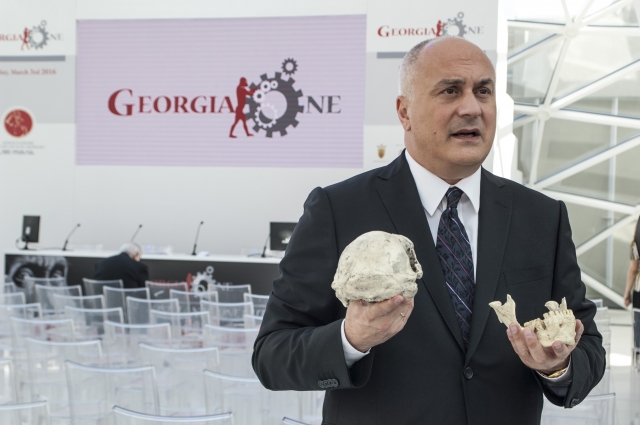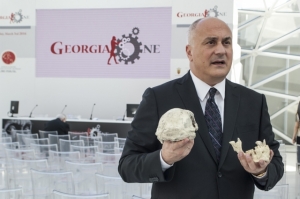More on Rome and the Shocking Dmanisi Findings
In a recent issue, GEORGIA TODAY touched upon the GeorgiaOne conference organized in Rome, to which went the world’s experts from various fields in order to find out more about the shocking discoveries made in Dmanisi, Georgia. More details of the conference have since been released.
Chaired by the Vice-President of Scudo San Giorgio Association, Claudio Marianti di Pergola, the conference consisted of three panels. One allowed an important presentation of the current realities and future prospects of the country, as well as Georgia’s history and, most significantly, its findings of the first European humans which were most decidedly in the spotlight at the Conference. The findings have resonated strongly in the scientific community, surprising many and leading to a bout of studies into the new theory of human migration.
“We all are interested in human evolution. All we knew that the first humans appeared in Africa, but the question was when humans left it and began to spread out into the world,” said David Lordkipanidze, famous archaeologist and General Director of the Georgian National Museum.
Previously, it was thought that humans had migrated from Africa about 1 million years ago. However, findings of skulls in Dmanisi in the Kvemo Kartli region of Georgia showed that it actually happened much earlier – 1.8 million years ago. The findings have given more detailed information about human evolution and settlement.
“Firstly we found out that humans back then were much more primitive than we previously thought. Their brains were very small, with a size of about 544 cubic centimeters, around 1/3 of our current brain size. Their bodies were not like ours and they used primitive stone tools. That means that humans left Africa much earlier and spread out while they were still at a very primitive stage,” explained Lordkipanidze.
The oldest fossils outside Africa have also been found in Georgia by archaeologists. In addition, the Dmanisi skull is the most complete ever found in the world. In fact, Georgia is the proud owner of a very rich collection of five skulls.
“The fifth Dmanisi skull represents and sums up features related to four different homo species: habilis, ergaster, rudolfensis and erectus. Therefore, the significance of this finding is that these hominids, previously placed in a time frame widely separated from one another, found themselves gathered in the same species, in the same historical period and in the same society,” said the President of Scudo di San Giorgio Association, Lelio Orsini d’Aragona.
David Lordkipanidze added that variability inside one group of humans that time was as much as we can find today.
The GeorgiaOne Conference also saw the attendance of numerous world famous experts. One of them was paleoanthropologist Yves Coppens (discoverer of hominid skeleton Lucy), whose lecture enriched Lordkipanidze’s main thesis. “Man is man as soon as he is man; with him appear the cognitive, technologic, intellectual, aesthetic, ethic, and religious facets. Homo religious is 3 million years old,” he said.
No less profound and significant was the speech given by Austrian scholar of anthropological philosophy, Josef Seifert, and whose statements helped the public to understand the philosophical consequences of the Georgian discovery. “I consider the data connected with the discovery of the so-called homo georgicus a significant empirical confirmation of the fact that the so uncritically accepted theory of evolution is open to criticism not only from a philosophical, but also from empirical and scientific points of view,” he declared.
The second panel consisted of a presentation of Georgia as country worth visiting and discovering: “a small and still untouched paradise”. The conference speakers, among whom sat Davit Bakradze, State Minister of Georgia for European and Euro-Atlantic Integration, highlighted that Georgia, with its rich cultural heritage, nowadays is an excellent destination for business investment, too.
The mission of the Scudo di San Giorgio Association is to increase relations and the reciprocal knowledge between the Italian and the Georgian Nations in the Cultural and Diplomatic fields and to bring humanitarian aid to Georgia.
Eka Karsaulidze












